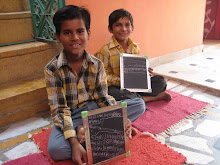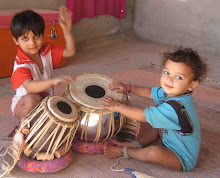When it comes to immediate deliverables, education yields few of those satisfying visual markers of accomplishment found in bridge building or tinker toy assemblage. There isn't a whole lot you can point to with education and say, "Look at them apples, buddy. That kid's got EDUCATION. Plain as daylight. No ifs, ands or buts about it." Sure, there are benchmarks of information accumulation: Mr Akram Khan, a little lad who can't walk by a bucket without putting it on his head, now can recite the English letter names and sounds from A to Z. Suriya, a fierce gal with a big, bold voice that is only rivaled by the size of her big, bold heart, now can fire up a computer and type a flawless document about her favorite animals.
But
what they know, a to z, computer literacy, is almost tangential to
how they know it. In the process of learning C for cat and cream and 'caps locks' means ALL BIG, ALL THE TIME, what Sarwar and I really want to sink into Akram and Suriya's brilliant minds is the process of learning, of fostering translatable skills of constructive reasoning, critical analysis and creative problem-solving that have expansive value far beyond our little classroom. G for gorilla and learning the destructive power of the 'delete' button are finite chunks of information vehicles for developing these infinite skills of knowledge possibility.
But, as is an all too common occurrence at The Merasi School, I'm forced to sit back and eat a hearty meal of my own words. Last Saturday night, I was drinking an exceptionally sweet cup of chai and talking with Sarwar about our glorious little school. "The kicker, my friend," I said vehemently, "is that 99% of the time, I don't have a CLUE what's working and what's not."
"Well, kids still come to school, right?" he said, the telltale signs of his co-founder ascending the Whelan Soapbox of Righteous Indignation.
"YES, they still COME, Mr Khan. But what does THAT say? Do you want to know what I'd like to know? I'd like to know HOW their lives are different since they started thinking of themselves as STUDENTS, along with sisters, brothers, daughters, sons, caretakers and chai-makers. Is that SO much to ask?"
"Perhaps, Ms Whelan, they've told you ."
"TRUST ME, sir, they have not said a WORD. I'd notice. I'm very good about noticing these kinds of things. People often remark about what an excellent noticer I am. And this noticer would notice something like that. In fact, it's the main thing I'd like to notice right now." Sarwar nodded and the conversation slipped into other avenues.
Well, the next day, the Old Noticer took a big cream pie to the face. The pie came in the form of young Hayad Khan, a little fellow I've mentioned before, who shattered history when he walked in the door of The Merasi School and broke a 36 generation old trend in his family of life without education. But, that day, Hayad demonstrated that that alone wasn't good enough. Because, trailing shyly behind Hayad were two of his closest buddies who had never walked inside a schoolhouse before.
"They're my friends," Hayad said, his arms wrapping around the necks of the two little boys. "I wanted them to come with me to my school. I think they'll like it." So, for Hayad, it was not enough to rewrite history. He was going to spit in its face, then rewire the future's narrative as he saw fit.
The Old Noticer probably could have noticed signs of this along the way -- Hayad's increasing punctuality, the gradual improvement of his hygiene, the evaporation of cherry bombs in his chest pocket. But I was too busy looking for what
I thought were signs that I totally missed what the
students put forth as signs. And so, I happily went home that night and ate pan upon pan of humble pie.
 Some of our students, like the Good (aspiring) Doctor Suriya Khan come into our lessons and classes with an innate confidence and we work to constructively build and grow that. Others, though, have a little less internal umph and one of our greatest academic challenges is to nourish and feed a sense of 'I can-itness' within our 41(!) students.
Some of our students, like the Good (aspiring) Doctor Suriya Khan come into our lessons and classes with an innate confidence and we work to constructively build and grow that. Others, though, have a little less internal umph and one of our greatest academic challenges is to nourish and feed a sense of 'I can-itness' within our 41(!) students.
